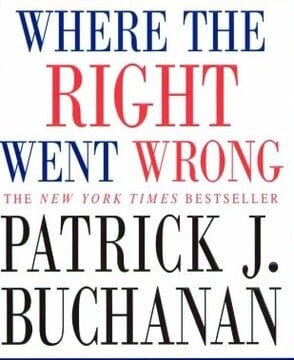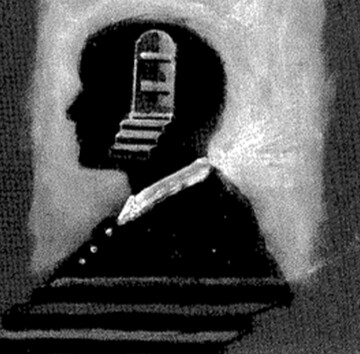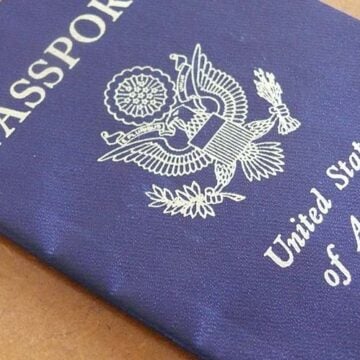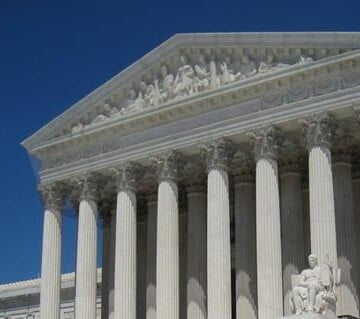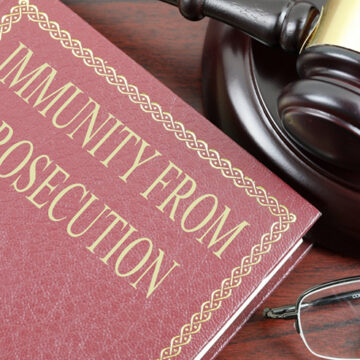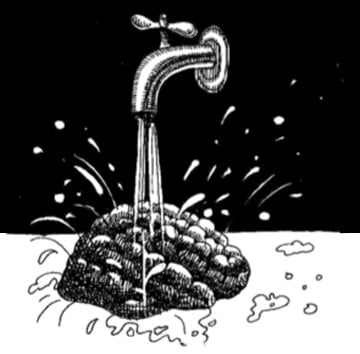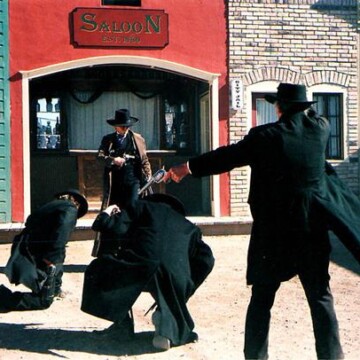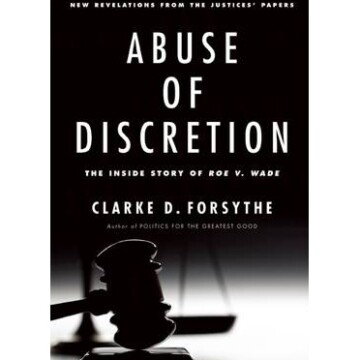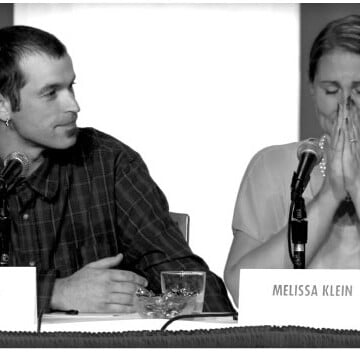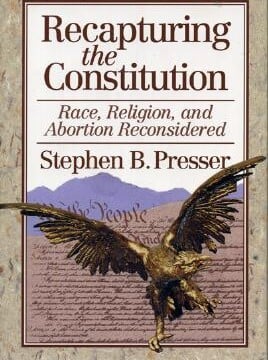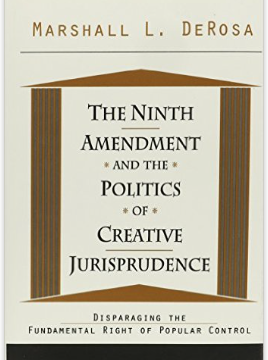The Supreme Court, in the case of Johnson v. Texas, arrogated to the federal government the power to decide that all states must allow the public burning of the federal government’s flag. This decision clearly contradicted both the near unanimous understanding of previous Supreme Court justices, including such constitutional nihilists as Chief Justice Earl Warren...
2065 search results for: Supreme%25252525252525252525252BCourt
Media Matters: Another Inquisitor In Fighting ‘Hate’
The granddaddy of the “anti-hate” movement is, of course, the Southern Poverty Law Center, which has made hundreds of millions of dollars and ruined the lives of conservatives by using innuendo, guilt by association and outright lies to smear anyone it doesn’t like. And that’s just about anyone to right of, say, Che Guevara. One...
Robert Bork, R.I.P.
I met Judge Robert Bork once, in the summer of 1989, when I was interning at Accuracy in Media. I was working on a feature story for the Washington Inquirer, AIM’s weekly newspaper, about the Smithsonian Institution’s use of tax dollars to fund the performance of Santeria and Palo Mayombe rituals on the Mall in...
Ditching the Cadaver
“Republics exist only on tenure of being agitated.” —Wendell Phillips If anything might have transformed the presidential election of 2004 from a dull ritual of mass democracy into an interesting and perhaps even meaningful act of civic decision, it would have been the presence of Patrick J. Buchanan, whose wit and sharp conservative intelligence enlivened...
In Praise of Elites
Being a lifelong elitist myself, I have long had a sneaking sympathy for a Trollope character, Sir Timothy Beeswax. In The Dune’s Children (1880), Beeswax is a dignified old politician who lives not for power but, quite unashamedly, for the trappings of office. Parliament, he believed, was a club so eligible that any Englishman would...
Free Speech in the Crosshairs
The biggest issue on the ballot this November is free speech.
Ditching the Cadaver
“Republics exist only on tenure of being agitated.” —Wendell Phillips If anything might have transformed the presidential election of 2004 from a dull ritual of mass democracy into an interesting and perhaps even meaningful act of civic decision, it would have been the presence of Patrick J. Buchanan, whose wit and sharp conservative intelligence enlivened...
The Forced Funding of Student Radicalism
I happen to be a conservative, a Christian, and white. I am also in the military, and I disapprove of homosexuality. At the University of Wisconsin, there is little tolerance for this combination of characteristics. As a student there, I served as the symbol of all that’s wrong with the world. My checkbook showed just...
A Third Way?
I went into the 2000 presidential campaign an enthusiastic supporter of Pat Buchanan’s bid for the White House as a third-party candidate. I emerged more convinced than ever that Buchanan would have made an outstanding president but skeptical that a serious right-wing party will be able to emerge, at least in the short run. I knew...
The Trump Indictment May Saddle the GOP With a Loser
Trump's rise in the 2024 election polls after his indictment plays into Democrat hands, potentially saddling Republicans with a candidate who cannot win in 2024 because he cannot acknowledge his past mistakes.
Birthright Citizenship Is a Breach in the Border
Trump’s promise to end birthright citizenship will be a battle but it’s a battle America can’t afford to lose.
The Never Trumpers: Sore Losers With Thin Skins
Emerald Robinson recently wrote a witty piece for The American Spectator puncturing the pomposity of the Never Trump wing of the conservative movement. At least one member of that wing, the thin-skinned Jonah Goldberg, now the holder of the “Asness Chair in Applied Liberty at the American Enterprise Institute,” was not amused, and he let...
A Lawyer’s Lawyer
Judge John Roberts of the U.S. Court of Appeals for the District of Columbia Circuit, whom President George W. Bush has nominated to take the place of retiring Associate Justice Sandra Day O’Connor, is what we used to call a “lawyer’s lawyer.” He comes from Harvard College, Harvard Law School, the Harvard Law Review, a...
Mr. Lincoln’s War An Irrepressible Conflict?
“[T]he contest is really for empire on the side of the North, and for independence on that of the South, and in this respect we recognize an exact analogy between the North and the Government of George III, and the South and the Thirteen Revolted Provinces. These opinions … are the...
All Three Branches of Government Need Legal Immunity
Presidential immunity, judicial immunity, and legislative immunity are essential to a system that allocates power through a democratic process.
The Most Dangerous Man in the Mid-South
This is the first of a series of first-person reports from American citizens who have run afoul of the bureaucracy. While we have made reasonable efforts to verify the accounts, the stories are personal statements of the authors. Almost 30 years ago, just a few weeks before I got married, I found a strange book...
Going It Alone
As the high lunacy of the 1990 budget negotiations showed, America’s federal arrangement has been replaced by a confederation of special interests that have less in common than the former colonies—or even, perhaps, than the states that comprise the United Nations. America resembles more a League of Interests than it does a nation. The solution...
Beating Affirmative Action
Is the composition of the Supreme Court the be-all and end-all of important societal conflicts? Are there effective ways that conservatives can address these conflicts—manifest in political battles over such things as affirmative action—apart from the Court? The Supreme Court’s decision in Fisher v. University of Texas, handed down on June 23, means affirmative action...
Liberal Tolerance on Display After Reversal of Roe v. Wade
After the Roe reversal protests erupted all across the country, with the largest in New York, Chicago, and Los Angeles—cities in states with virtually zero probability that their lawmakers will pass laws restricting abortion.
A Killing Privacy
Abortion is not something to discuss in polite company. Unlike a good, clean murder committed from natural motives such as revenge, envy, and greed, abortion is something slimy, more like a sex crime. Many parents must be tempted, from time to time, to commit mayhem upon their offspring. Such feelings are natural; but women who...
Leave the Kids Alone
The recent Supreme Court decision striking down a Silent Prayer Law in Alabama came as a shock to many people. What harm could be done by a moment of silence that the students were free to dedicate—or not dedicate—to a Supreme Being? Religion, it now seems, is to be treated like the daughter who disgraces...
Heightened Security
Federal judges in California have been busy. In August, Judge Vaughn Walker held that it is irrational to limit marriage to one man and one woman. Following in Judge Walker’s footsteps, Judge Virginia A. Phillips struck down the congressional prohibition against homosexuals in the military as violating the First Amendment and the Due Process Clause...
The Huge Stakes of Thursday’s Confrontations
Thursday is shaping up to be the Trump presidency’s “Gunfight at O.K. Corral.” That day, the fates of Supreme Court nominee Brett Kavanaugh and Deputy Attorney General Rod Rosenstein, and much else, may be decided. The New York Times report that Rosenstein, sarcastically or seriously in May 2017, talked of wearing a wire into the...
USA becomes military dictatorship
With little fanfare, in the past week the United States officially became a military dictatorship. The U.S. Supreme Court declined to hear the appeal of a suit brought against the 2012 National Defense Authorization Act that allowed indefinite detention of U.S. citizens. That means the military now can, at any time, “disappear” you, even if...
Killing Off Limited Government
The federal government cannot ban criminals from bringing guns to schools, but it can arrest a person for growing marijuana at home to ease nausea from chemotherapy. Such is the state of Supreme Court jurisprudence. The intellectual case for the “War on Drugs” faded long ago. Criminalization of what is primarily a moral and health...
Will Justice Amy Star in ‘The Five’?
By nominating Federal Judge Amy Coney Barrett to the Supreme Court, Donald Trump kept his word, and more than that. Should she be confirmed, he will have made history. Even his enemies would have to concede that Trump triumphed where his Republican predecessors—even Ronald Reagan, who filled three court vacancies—fell short. Trump’s achievement—victory in the...
Sotomayor and the Last of the WASPS
If Judge Sonia Sotomayor is confirmed, the U.S. Supreme Court will consist of six Catholics, two Jews and precisely one white Anglo-Saxon Protestant in the form of Justice John Paul Stevens, who is 89 years old and boasts of two important WASP insignia: inherited wealth and a bow tie. He also thinks that Shakespeare’s plays...
A Landmark Decision
The Supreme Court, in its landmark 6-3 decision in Atkins v. Virginia, has taken the penultimate step toward total elimination of the death penalty in the United States. The facts of the case are clear: Daryl Atkins and an accomplice plotted to rob a customer in a convenience store; abducting their victim, they took him...
Dress Rehearsal for Impeachment
Judge Brett Kavanaugh’s nomination to the Supreme Court was approved on an 11-10 party-line vote Friday in the Senate Judiciary Committee. Yet his confirmation is not assured. Sen. Jeff Flake, Republican of Arizona, has demanded and gotten as the price of his vote on the floor, a weeklong delay. And the GOP Senate has agreed...
Federalizing Funerals
The Westboro Baptist Church and its bizarre octogenarian pastor, Fred Phelps, won a major victory at the Supreme Court in March. In an 8-1 decision, the Court reversed a multimillion-dollar award to the family of Marine L.Cpl. Matthew Snyder, who was killed while serving in Iraq. In 2006, Westboro members showed up outside the fallen...
The Fruits of Fraud
The worst thing about the U.S. Supreme Court’s 1973 legalization of abortion in all 50 states and U.S. territories has not been the 55 million—and counting—dead babies, as horrible as that has been, but the damage it has caused to the rule of law, specifically the U.S. Constitution. In his dissent, Justice Byron White branded...
On a Supreme Court Appointment
Chronicles carries informed and very interesting articles. You have literate and intelligent authors, and I look forward anxiously to the arrival of each issue. I want to compliment you particularly on the article on the judiciary by William F. Harvey (“An Appointment to the Supreme Court,” Vital Signs, June). It is a tragedy that Judge...
Sharpening the Swords
On June 25, one day before the U.S. Supreme Court declared that a man can marry a man and a woman can marry a woman, the Washington Post published an op-ed by Louise Melling, the deputy legal director of the American Civil Liberties Union. Miss Melling’s announcement that the ACLU would no longer support the...
“Empathy” And The Court
The President wants an empathetic jurist to replace David Souter on the U.S. Supreme Court. He will likely get such a one. What the country will get in that event is one more senator or cabinet member—as straw boss, head knocker, high and mighty arbiter of high and mighty matters. A sort of modern Roman...
We’ve Only Just Begun
The Left is not generous in victory. The ink on the Supreme Court decision in Obergefell v. Hodges was barely dry before a vicious assault on organized religion in this country was launched, a multipronged offensive with the clear intention of marginalizing Christians and banishing them from the public square. The first shot was fired...
Forever 1965
In Shelby County v. Holder, the Supreme Court struck down the coverage formula of the Voting Rights Act of 1965 (VRA). Under the formula, states or their political subdivisions are “covered jurisdictions” if they maintained in the 1960’s and early 70’s tests or devices (e.g., a literacy test or moral character requirement) as a prerequisite...
57 million babies and counting, RIP
Something died in America 42 years ago today. That’s when the U.S. Supreme Court handed down its 1973 edict, Roe v. Wade, forcing all 50 states to almost completely legalize abortion on demand – even those states that already had legalized it. About 57 million babies have been killed since. But something more died: Maybe...
A Supreme Disqualification
In June, the U.S. Supreme Court once again trampled on the rights of the states. The media took little notice. Since it became a state in 1912, Arizona has had a citizenship requirement for voters. In 2004, the people of the state, in an effort to combat voter fraud, enacted Proposition 200. This initiative requires...
Kim Davis vs. Judicial Tyranny
“If the law supposes that, the law is a ass—a idiot.” Charles Dickens gave that line to Mr. Bumble in “Oliver Twist.” And it sums up the judgment of Rowan County Clerk Kim Davis about the Supreme Court’s Obergefell decision, which said the 14th Amendment guarantees same-sex couples the right to marry. Davis refused to...
Constitutional Disorder
The Supreme Court, as Stephen Presser laments, has wandered far off course; increasingly its Justices have taken to reading their own preferences and prejudices into the Constitution, thereby abandoning their solemn obligation to act as its guardians by interpreting its provisions in accordance with the basic values and intentions of the Framers. What is more,...
Scandalous Education: UT’s War on Standards
In 2003, the Supreme Court expected “that 25 years from now, the use of racial preferences will no longer be necessary” in university admissions. That was the conventional wisdom of the time. Affirmative action was supposed to be a temporary deviation from the principle of nondiscrimination, a remedy for injustices past, a bit of accelerated...
Rediscovering Philadelphia
“There is no liberty if the power of judging be not separated from the legislative and executive powers.” —Montesquieu The theme that unites the short, somewhat disparate eight chapters of this book is the use by the Supreme Court of unenumerated rights—that is, rights beyond those specifically enumerated in the Bill of Rights—to invalidate state...
Let Us Pray (But to Whom?)
In May, the Supreme Court held that the First Amendment’s Establishment Clause is not offended when a city council opens its meetings with a short prayer (Town of Greece v. Galloway). While this result seems to be an example of commonsense constitutionalism, conservatives should not be too quick to pat the Court on the back. ...
Recess Games
“Supreme Court sharply limits presidential power on recess appointments.” Thus read the headline in the Los Angeles Times after the High Court’s decision in National Labor Relations Board v. Canning. Applying its spin to the decision, National Review opined that “the Court rejected the administration’s power grab on recess appointments” and clarified when a recess...
A “Containment Policy” for the New Cold War
Americans regularly accept expropriations—legal, moral, and economic—from the central government that would have driven our 18th- and 19th-century ancestors to arms. The Constitution reserves to the states and local communities all powers necessary to provide legal protection for valuable ways of life. These rights have been usurped by the central government, especially by the Supreme...
Rediscovering Philadelphia
“There is no liberty if the power of judging be not separated from the legislative and executive powers.” —Montesquieu The theme that unites the short, somewhat disparate eight chapters of this book is the use by the Supreme Court of unenumerated rights—that is, rights beyond those specifically enumerated in the Bill of Rights—to invalidate state...
Judge Moore & God’s Law
When elected chief justice of the Alabama Supreme Court in 2000, Judge Roy Moore installed in his courthouse a monument with the Ten Commandments that Moses brought down from Mount Sinai carved into it. Told by a federal court his monument violated the separation of church and state, Moore refused to remove it and was...
Plessy v. Ferguson—One Hundred Years Later
One hundred years ago this May, Plessy V. Ferguson was decided. The Supreme Court’s 1896 decision upheld Louisiana’s law that required all passenger railways operating within the state to have “equal but separate accommodations for the white and colored races.” Over the years, the import of the decision and public perceptions of such state regulations...
Books and Lovers
Back in 1839, an Englishman by the name of Alexander Walker wrote a manual by the name of Woman, in which he quoted Hume: “Among the inferior creatures, nature herself, being the supreme legislator, prescribes all the laws which regulate their marriages, and varies those laws according to the different circumstances of the creature.” So...
Line Item Veto Act
The Line Item Veto Act has been struck down by the Supreme Court. As I predicted in the February issue of Chronicles (“Reining in the Feds“), the Court (in Clinton v. City of New York) declared that the act violated the Constitution’s Presentment Clause, which commands that a bill passing both the House and the...
